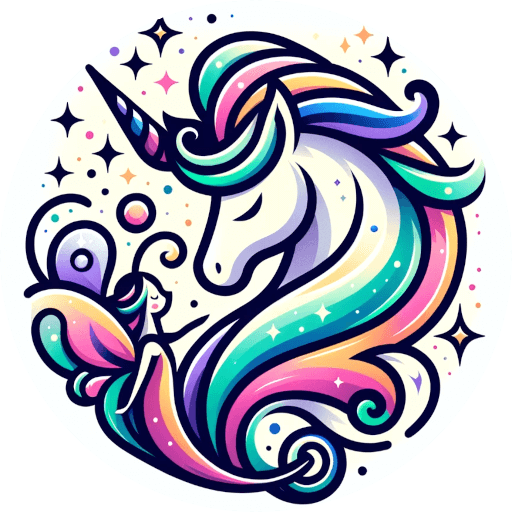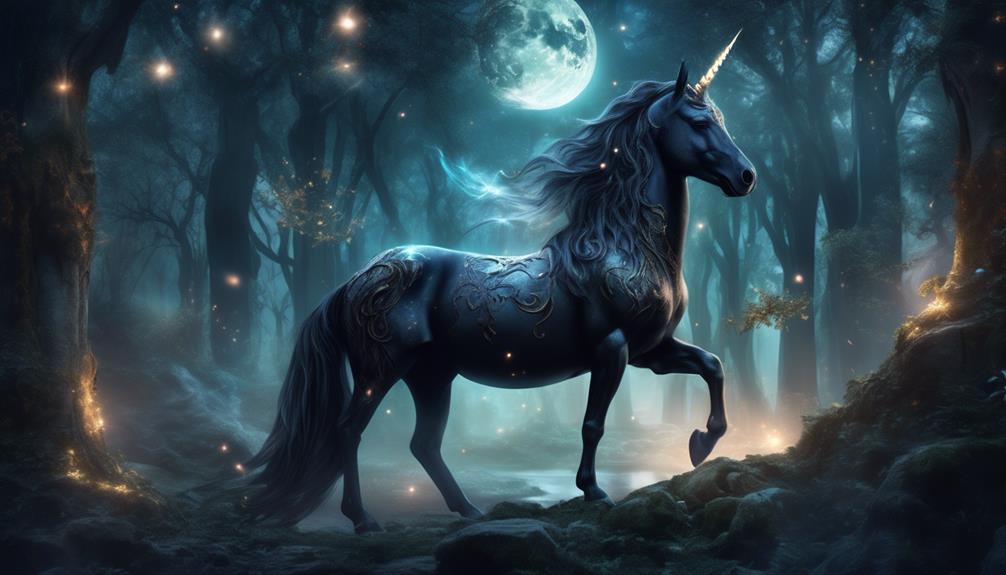What is it about the enigmatic black unicorn that continues to captivate the human imagination?
The allure of this mythical creature lies in its elusive nature, steeped in symbolism and mystery.
From ancient mythology to modern literature and art, the black unicorn has left an indelible mark, evoking both fascination and intrigue.
Its portrayal as a symbol of power and strength, as well as its enigmatic presence in various cultural contexts, adds layers to its mystique.
As the exploration of its origins, symbolism, and cultural significance unfolds, the complexities and enigmas surrounding the black unicorn beckon to be unraveled, offering a glimpse into its enduring appeal and significance.
Key Takeaways
- Black unicorns are often depicted as slim, beautiful creatures with dark eyes and a pointed black horn.
- They are known for their hunting abilities and are described as formidable predators due to their speed.
- In mythology and symbolism, black unicorns have varied representations and symbolize power, strength, freedom, and the struggles faced by minorities.
- Black unicorns are frequently represented in literature, art, and games, often with positive associations, but they can also be associated with negative stereotypes such as being associated with evil.
Appearance and Characteristics of Black Unicorns
The enigmatic black unicorn, with its coal-black coat, spindly legs, and dark eyes, stands as a striking and formidable creature in the realm of mythical beings. Legends surrounding black unicorns depict them as a darker, more mysterious counterpart to the traditional white unicorn.
In various cultures, these creatures are associated with unique symbolism. The cultural significance of black unicorns has evolved over time. The Ancient Greeks initially portrayed unicorns as black, symbolizing freedom and good fortune. However, later interpretations associated them with negative connotations.
In literature and art, black unicorns are often depicted as powerful and appealing creatures. They symbolize strength, freedom, and the struggles faced by minorities. In games, they're frequently depicted with negative stereotypes.
Understanding the appearance and characteristics of black unicorns sheds light on their diverse cultural significance and the intriguing symbolism they embody.
Black Unicorns in Mythology and Symbolism
Black unicorns in mythology and symbolism have captivated the imagination of cultures around the world, embodying a complex array of meanings and interpretations.
The origins and evolution of black unicorns in mythology reveal a significant shift in their cultural significance and interpretations. Ancient Greeks originally depicted unicorns as black, associating them with freedom and good fortune. However, over time, they became linked with negative connotations.
The black unicorn has come to represent power, strength, freedom, passion, anger, and the struggles faced by minorities. It may also symbolize the experience of being black in a predominantly white world.
Despite some negative associations, black unicorns aren't necessarily associated with evil and have varied representations in mythology, reflecting the juxtaposition inherent in their symbolism.
Black Unicorns in Literature and Art
Represented in various forms of artistic expression, black unicorns in literature and art captivate audiences with their alluring and powerful presence. Depictions in fantasy novels often portray black unicorns as beautiful and appealing creatures, with positive associations given to their coloration as part of nature.
In contemporary art, black unicorns symbolize power and the pain of being an outcast, exploring themes of freedom, passion, and anger. The symbolism of black unicorns in literature and art varies, with some works addressing the struggles faced by minorities and the juxtaposition inherently present in their representation.
From a scholarly perspective, black unicorns in literature and art offer a unique lens through which to explore themes of power, identity, and societal perceptions, making them a compelling subject for both creators and audiences alike.
Black Unicorns in Games
Pivoting from the representation of black unicorns in literature and art, the role of black unicorns in games as powerful and captivating creatures becomes evident in various gaming contexts.
Role playing games often feature black unicorns as formidable adversaries or allies, adding depth to the gaming experience.
In video games, black unicorn characters are often portrayed with a sense of mystery and strength, captivating players with their enigmatic nature. They're sometimes depicted as noble steeds or powerful mythical beings, enriching the game's storyline and world-building.
However, it's important to note that the portrayal of black unicorns in games can perpetuate negative stereotypes, such as associating them with evil.
Despite this, black unicorns in games continue to intrigue and fascinate players, adding an element of mystique and allure to the gaming realm.
The Mythology and Meaning of Black Unicorns
The enigmatic nature of black unicorns has been a subject of fascination and intrigue throughout mythology and literature, often carrying profound symbolism and meaning.
The interpretation and significance of black unicorn dreams have captivated the imagination of many.
In various societies, black unicorns hold cultural significance and are represented differently. Ancient Greeks initially depicted black unicorns as symbols of freedom and good fortune. However, over time, they became associated with negative connotations.
In some contexts, the black unicorn represents power, strength, freedom, passion, and anger. It also symbolizes the struggles faced by minorities and being an outcast in predominantly white societies.
Juxtaposition is inherently present in the symbolism of black unicorns, reflecting the complexity and depth of their meaning.
Frequently Asked Questions
Are There Any Real-Life Sightings or Evidence of Black Unicorns?
Real-life sightings or evidence of black unicorns are not documented. Their existence stems from cultural origins and historical significance, predominantly in mythology, literature, and games. These enigmatic creatures remain a product of imagination.
What Is the Significance of the Black Unicorn's Horn in Mythology and Symbolism?
The significance of the black unicorn's horn in mythology and symbolism is multifaceted. It represents power, strength, and freedom. In comparative analysis, it's portrayed differently across cultures, from being a positive symbol to reflecting struggles faced by minorities.
How Do Black Unicorns Compare to Other Mythical Creatures in Literature and Art?
Black unicorns, in comparative analysis with other mythical creatures in literature and art, are often depicted as powerful and alluring beings. Artistic interpretations emphasize their beauty and strength, adding to their enigmatic allure.
Are There Any Positive Representations of Black Unicorns in Games, or Are They Always Associated With Evil?
Positive portrayals of black unicorns in games exist, contrary to common belief. While some games associate them with evil, others depict them as powerful and majestic creatures. Their representation in games varies, reflecting the diverse nature of mythical creatures.
What Are the Cultural and Historical Origins of the Black Unicorn Symbolism in Different Societies?
The cultural origins of black unicorn symbolism are rooted in ancient Greek mythology, initially associated with freedom and good fortune. Over time, the symbolism evolved, representing power, strength, and struggles faced by minorities. Historical symbolism encompasses a juxtaposition of positive and negative connotations.

